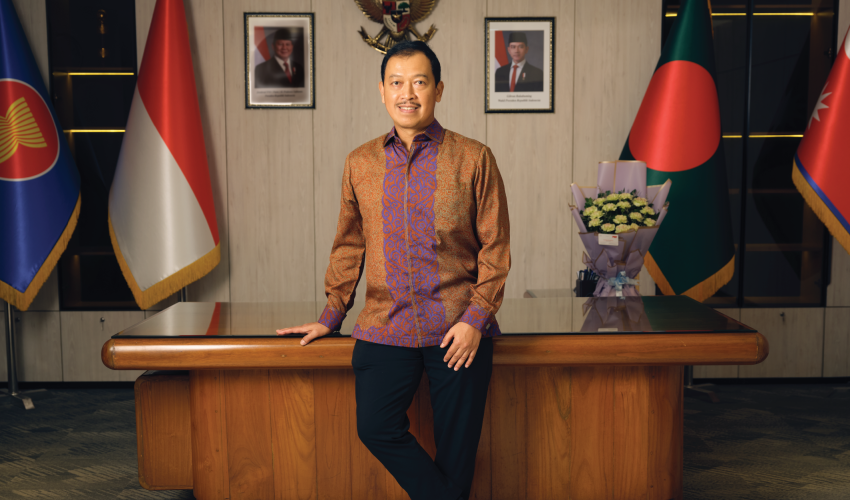Ambassador Heru Hartanto Subolo shares his thoughts on connections, transitions, and falling in love with golf
By Sabrina Fatma Ahmad
Post-revolution Bangladesh has some soul-searching to do. With the dust still settling on the unseating of a fifteen-year regime, global conflicts turning international relations into a high-stakes game of the-floor-is-lava, and climate change testing our resilience with floods and high temperatures, there’s no way we’re getting out of this without the help of a few good friends. And that’s exactly what the interim government is trying to do, with the Chief Advisor reaching out to his counterparts in the ASEAN nations and other blocs to strengthen bilateral ties. After his talks with Malaysian PM Anwar Ibrahim during his recent Dhaka visit, Dr Yunus recently set his sights on Indonesia, with a call to the outgoing Indonesian Ambassador Heru Hartanto Subolo.
Ambassador Heru H Subolo has been representing Indonesia in Bangladesh since December, 2021 after having served in various capacities in Australia, USA, Norway, and other places. In his Bangladesh tenure, HE Subolo has been instrumental in strengthening bilateral relations between Indonesia and Bangladesh. His efforts have focused on enhancing trade, particularly in the apparel and textile sectors, and fostering cultural and diplomatic ties. Notably, he signed several Memorandums of Understanding (MoUs) in 2023, covering cooperation in health, energy, and agriculture.
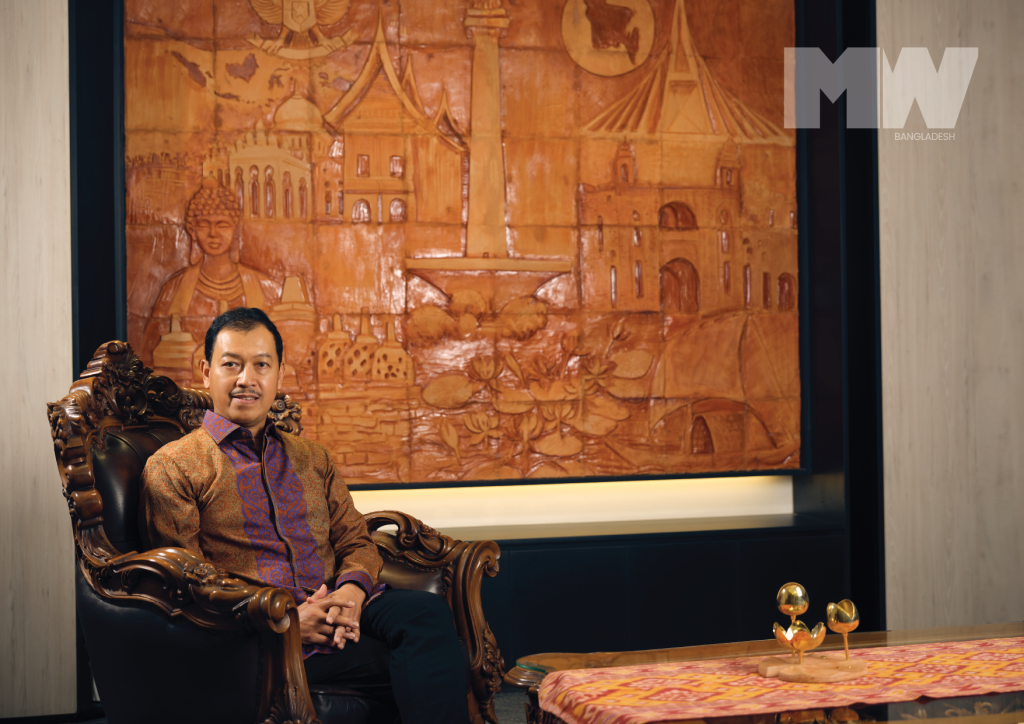
At MW, with our renewed interest in governance and the future of our country, we found ourselves on an unseasonably warm late October morning, making our way to the Indonesian Embassy to find out more.
Stepping into the expansive foyer was a relief from the blazing sun outside, and the minimalist furnishings that put all the spotlight on the walls and some selected installations, like the life-sized model Javanese dancer, or the Balinese wood carvings, instantly brought in a sense of relaxation. A quick ride on the elevator, whose doors were painted over with batik murals, and we were ushered into the office of the ambassador, the man himself and his team coming out to greet us in colorful batik shirts that told us we were about to get one vibrant photo shoot.
Over a modest and delectable spread of toasted tempeh, fried bananas, and that famous Javanese coffee, we talked about the beginnings of the Ambassador’s journey into diplomacy.
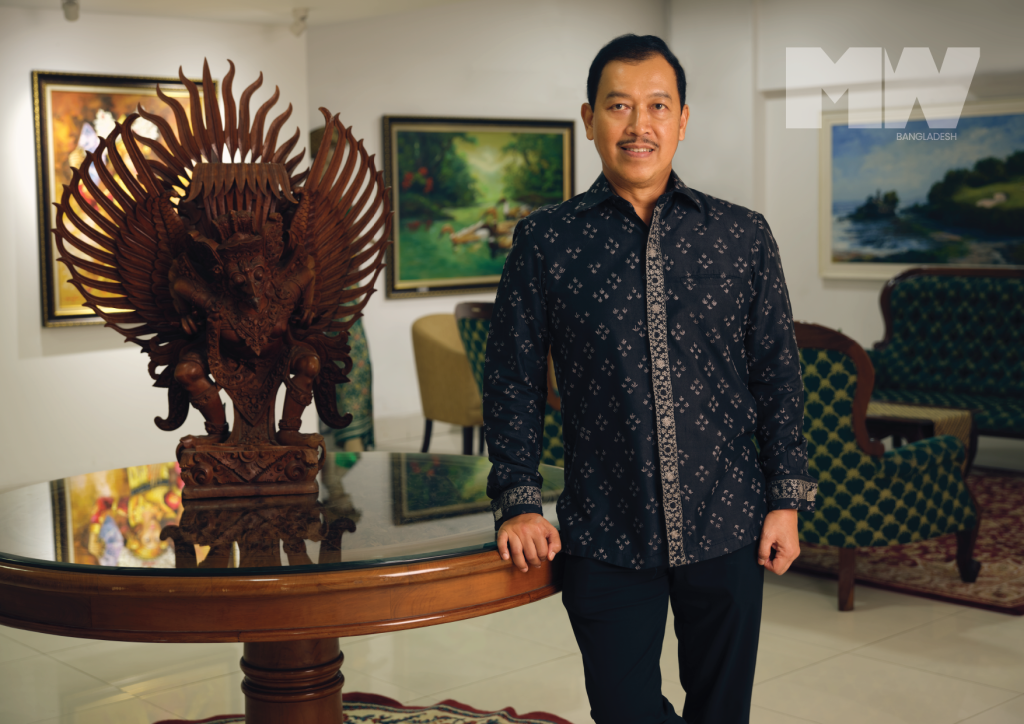
MANIFEST DESTINY
“When I was a child, living in a small city in Solo (Surakarta), television was rare and we had limited offerings, but I used to listen to international radio programmes, and sent comments on the shows from ABC Australia, from Chinese radio shows. It made my childhood so happy,” he recalls. These early exposures to foreign cultures stoked in young Heru a stronger desire to see the world, to meet different people, and to connect with the many cultures out there.
These desires focused into an ambition to forge a career in diplomacy. He graduated with a degree in international relations from Padjadjaran University in Bandung, the second biggest city after Jakarta, but realized the timing wasn’t right, so he pivoted to the private sector. While the detour may have delayed his satisfaction, it did give him first-hand insights into the energy sector, which would prove handy later. When the next call for applications to the Ministry of Foreign Affairs came through, he took his shot again, applying with some 5,000 other candidates, of which only about 100 made it through, and in 1991, HE Subolo was finally representing Indonesia in countries like Australia, Norway, and the US. I ask him how it felt to be back in Asia.
“Well, I’m so excited actually. I’m lucky that my government chose me to come to Bangladesh,” he gushes, telling us how he and his wife were amazed by everything he saw in the country, and the contrasts between their lived experience of Bangladesh and the media reports about it. “You have challenges, of course, but I also see so many beautiful things, even in Dhaka – beautiful lakes, beautiful gardens, and above all, beautiful people. Thank you so much. You are so friendly. You are so hospitable. I have felt like I have come not to a foreign country but to my extended family. I really have a great connection with the people of Bangladesh. And I enjoyed traveling around the country. I visited Khulna. I visited Chittagong several times, and Sylhet, and Rajshahi during the mango season.”
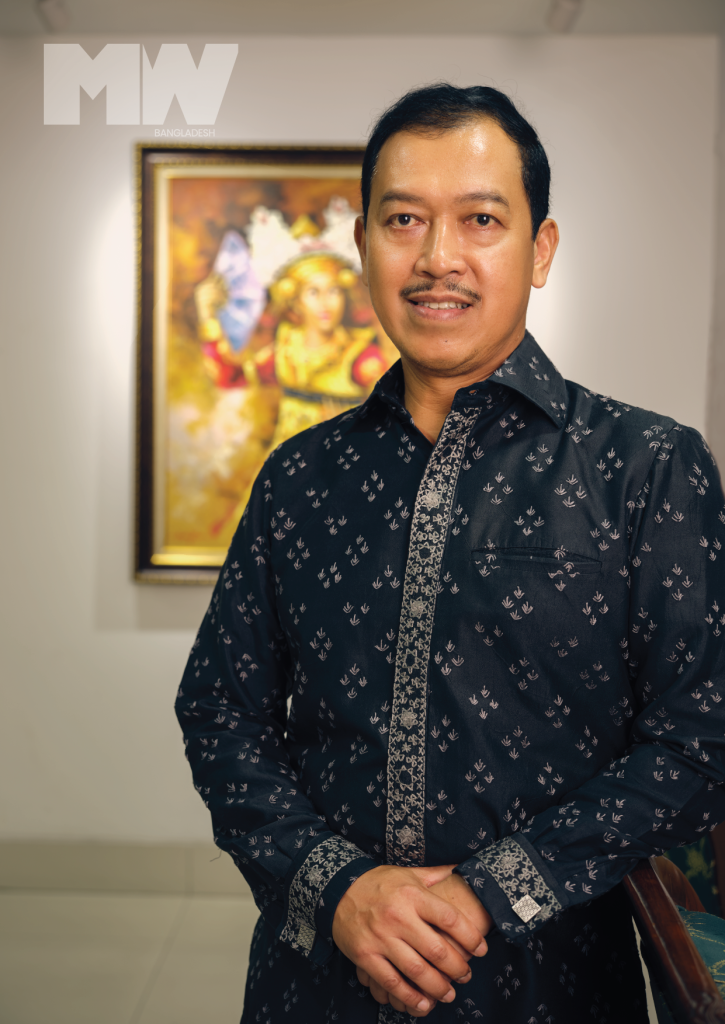
GREEN LINKS AND A GREENER FUTURE
The talk of connecting with people transitions to a talk about hobbies and activities. Of course, anyone who knows a little bit about His Excellency also knows about his love of golf. A love he discovered three years ago, which he approached with the same dedication be brings to everything, and which led to him becoming President of the Tiger Golf Club. Aside from pure enjoyment, the Ambassador talks about the sport as a means of connecting important stakeholders to achieve shared goals. “Sometimes I feel like I’m not only the ambassador of Indonesia, but also ambassador of Bangladesh,” he laughs, talking about how he has facilitated delegations of Bangladeshi golfing enthusiasts visiting Indonesia, primarily to play golf, but also to connect with the Bali Chamber of Commerce, and to make business connections and get involved in charitable efforts. As HE Subolo also represents Indonesia in Nepal, he was able to take Bangladeshi golfers to Kathmandu, and to Chengdu in China.
“I am promoting the golf in Bangladesh, and I’m also serving an Indonesian policy. Informally, yes. But this made me proud, because this connection is important to humanity.”
We talk about other sports, including badminton, which is enjoyed by both our countries, and the approaching winter, warmer in recent years due to climate change, which has also been wreaking havoc across Bangladesh with devastating floods.
Bangladesh and Indonesia are both members of the Indian Ocean Rim Association, and with Bangladesh as a deltaic country and Indonesia a nation of islands, climate change is definitely a concern we are collabo-rating on. HE Subolo talks about his country’s attempts at carbon reduction, and Indonesia’s commitment to wean itself o non-sustainable energy resources like coal, something his prior work experience gives him a keen insight on. “What we do is we can share the way we develop the sustainable energy project,” he informs us, adding that the MFA in Indonesia has already been in talks with Bangladesh regarding solar power. He proudly talks about the Cirata Water Reservoir, where Indonesia boasts the largest floating solar power grid in Southeast sea.
Alongside being members of regional collectives like IORA, Bangladesh and Indonesia have also been exploring bilateral economic agreements, with a view to a mutually beneficial partnership for a sustainable future. Ambassador Subolo referenced Retno Marsudi, the former Indonesian Foreign Minister, who officially commenced her duties this year as Antonio Guterres’s Special Envoy for Water.
WHERE DO WE GO FROM HERE?
Climate concerns and a shared love of badminton aren’t the only things our two nations have in common. We talk about our July revolt, and Bangladesh in transition. “Indonesia has many things to share with Bangladesh in terms of democratic transitions,” HE Subolo consoles us. “We had experienced that way in the late 1990s, in which the movement of students also happened in Indonesia, demanding reforms, in 1998.” He is referring to the Reforms, which happened in May of 1998, which led to the end of Suharto’s presidency, which was precipitated by the Asian Financial Crisis. “It takes time to come to the stage where Indonesia is at right now, but there’s always something that we can learn and we can share together.”
The Ambassador does give us three things to consider – economic reforms, a decentralized government, and free and fair democratic elections – adding that even in his country, they are still tweaking things. He reminds us that their population, spread over some 17,000 islands, with diverse cultures and customs, presents a unique challenge, and it is difficult to make everyone happy.
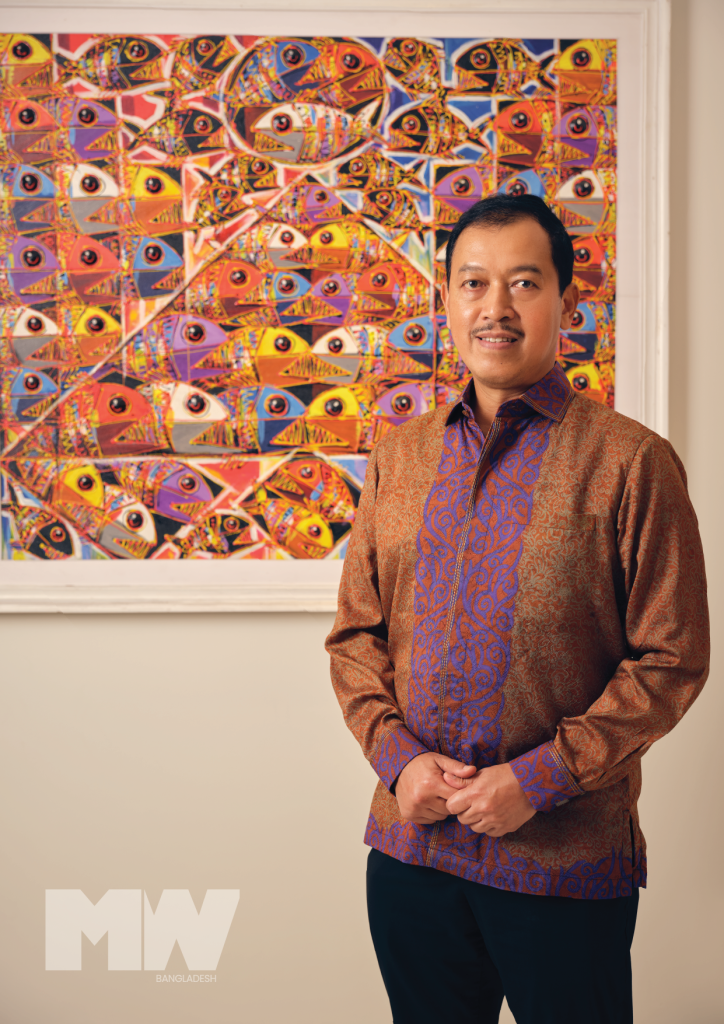
When asked for some insights on how they approached unity amidst such diversity, he told us about the Youth Pledge, a declaration made on 28 October, 1928 by young Indonesian Nationalists at a conference in the then-Dutch East Indies. They proclaimed three ideals, one motherland, one nation and one language, uniting the islands under the banner of a single nation, and one official language. The language they chose for their official language was not the language spoken by the majority of the population (Javanese), but the one spoken by the smallest minority on Riau (Bahasa), which is spoken in Malaysia, Singapore, and southernmost parts of the Philippines. This decision, which in some ways is the mirror opposite of what happened on Ekushey February, helped strengthen regional cooperation amongst their ASEAN neighbors.
Home to the largest Muslim population in the world, Indonesia also has some experience in navigating cultural di erence within its diverse communities while maintaining unity as a nation. HE Subolo charms us with examples of how the religious leaders employed traditional wayang puppets to spread their messages. He talks about the informal exchanges that have occurred between our two countries, with hundreds of Indonesian Muslims flocking to Bangladesh for Biswa Ijtema, and many of our faithful travelling to Indonesia to participate in the tabliqs.
And on the topic of this bilateral travel, the Ambassador hopes that with strengthening economic ties between our nations, the Bangladeshi diaspora in countries like Australia and New Zealand would use Indonesian locations such as Bali as a hub to connect with their home-land with more travel. “We still want to connect Indonesia and Bangladesh better and in a larger capacity. You have great resources that need to be exposed, need to be promoted in countries like Indonesia. We’re exporting oil, cooking oil, pulp for your paper mills. But we need more diversification product from Bangladesh. Currently we only import the juice and some other low-value materials in very limited numbers and the value is very small. But I see there are a big opportunity in bringing other Bangladesh products such as pharmaceutical products. You have more than 300 pharmaceutical companies. My colleagues and I have enjoyed the benefits of good Bangladeshi doctors. Some of the relatively higher medical costs in Indonesia come from the price of the medication, so there is definitely an opportunity for you here. I also think there is a market for your unique textiles in Indonesia. So there are definitely avenues for more economic exchange.”
Perhaps motivated by a degree of self-interest, I enquire about the visa situation, considering that the Visa on Arrival provision – the first one granted to Bangladeshi passport holders by an ASEAN nation – was scrapped during Covid. The Ambassador assures me that e-visas are still available, and the Embassy also accepts applications. “The visa is granted by the Immigration Department in Jakarta, but we can help with the processing as long as they fulfil all the immigration requirements. You can get it in 5-6 days.”
Ambassador Subolo’s tenure in Bangladesh ends on November 8, after which he goes back to Jakarta, where for the immediate future, he is likely to serve as a special advisor for the minister.
Photographed by Naymul Islam




